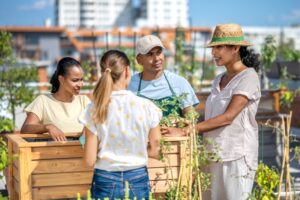 Foraging. The phrase usually brings to mind the idea of living in a remote cabin in the woods without modern amenities. Foraging is not restricted to individuals who own vast areas of land. It is possible to forage for food in urban and suburban areas. This post provides information on urban and suburban foraging, including its legality and tips on how to get started in your local community.
Foraging. The phrase usually brings to mind the idea of living in a remote cabin in the woods without modern amenities. Foraging is not restricted to individuals who own vast areas of land. It is possible to forage for food in urban and suburban areas. This post provides information on urban and suburban foraging, including its legality and tips on how to get started in your local community.
What is Urban Foraging?
The process of collecting wild plants and mushrooms that flourish in your local surroundings is known as urban foraging. Some of these plants can be consumed as food or used for medicinal purposes. It is possible to eat dandelions found in local parks. Additionally, acorns from trees throughout the city can be roasted or processed into flour.
Foraging is becoming increasingly popular among young TikTok influencers and fans. Foraging videos such as this one, the technique has gained popularity among people as a way to supplement their diets, with over 72 million views received. Could you please provide more context or information about what you are referring to? Engaging in foraging can help you gain knowledge about the natural world and develop a deeper understanding of your environment. You have the option to gather wild foods that have not been exposed to herbicides or pesticides.
Is Urban Foraging Legal?
In general, it is legal to harvest plants, fruits, nuts, and wild mushrooms from public land in most areas. In urban or suburban environments, this typically includes parks, sidewalks and walkways, the grounds around city buildings, along riverbanks and creeks, and other public access areas. You can also use maps like the one provided by FallingFruit.org to help find foraging spots in your area. However, you should always check your local laws and property ownership records. Some urban foraging activities may be restricted or prohibited in certain locations.
Furthermore, you should not trespass on private property unless you have the consent of the property owner. If you ask first, some property owners may allow you to collect fruit, nuts, and other things from their land. You could discover that your neighbors and other property owners in the vicinity have surplus produce that they are willing to share.
How to Begin
Foraging in cities can be an interesting and rewarding activity. To begin, go online or chat to local gardeners, wild food lovers, or botanists about what plants are native to your region. Consider taking a plant identification class or joining a local outdoor club to learn more about the plants you could see in your area.
To ensure that you are being responsible while harvesting, it is crucial to follow ethical techniques that show respect for the environment and other individuals who may also be utilizing the land. It is recommended to only take what is necessary for personal use, unless it is given to you as a gift and you intend to share it with others.
To make your foraging experience more convenient, it is recommended to have some basic foraging tools. These may include a basket or reusable bag, paper bags (avoid plastic if collecting mushrooms as it can make them slimy), pruning shears or a small knife, and small containers to keep your foraged plants separate and prevent them from getting crushed.
It is recommended to avoid harvesting in areas where chemical pesticides or fertilizers have been applied. Regions that are located near heavy traffic or agricultural runoff sources, such as farm fields, orchards, and factories, are susceptible to chemical contamination. Golf courses and other lawns that have undergone pesticide treatment pose similar risks. To confirm if an area has been treated, it is recommended to ask the owner or local authorities. It is important to wash and prepare any foraged items carefully before consuming them to ensure your safety.
Engaging in foraging can help you establish a deeper connection with nature, acquire knowledge about the plants that grow in your area, and also provide you with the opportunity to obtain free food. You can start foraging in your own city or suburb now that you have the necessary knowledge. It is possible to find a forager’s paradise in your own backyard.
Are you planning to move to a new location soon? To view high-quality rental listings in your area, it is recommended that you get in touch with your local Real Property Management.
We are pledged to the letter and spirit of U.S. policy for the achievement of equal housing opportunity throughout the Nation. See Equal Housing Opportunity Statement for more information.


